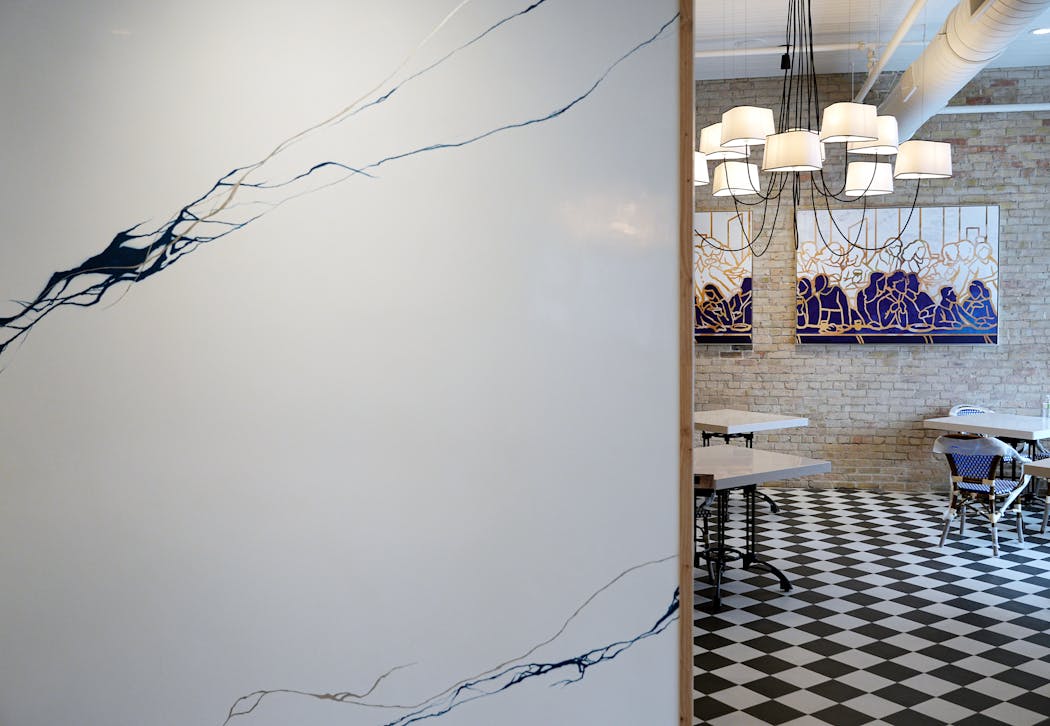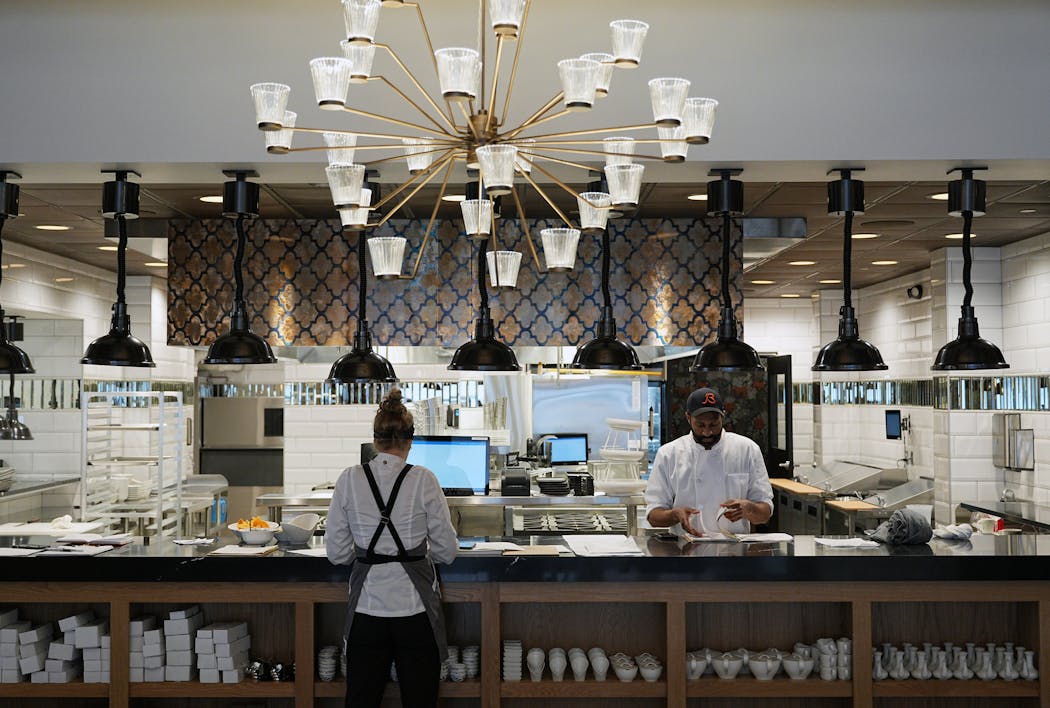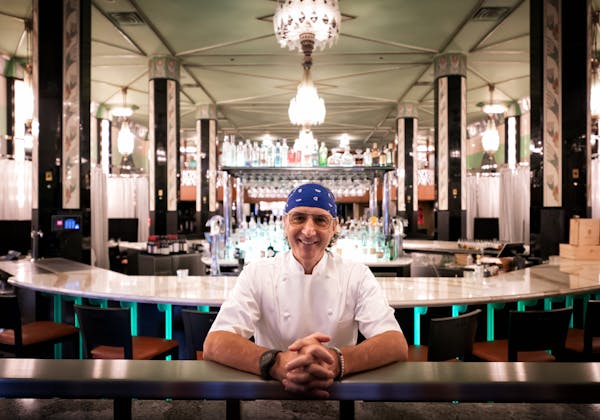When your name is already in lights on a marquee over a 1930s Art Deco masterpiece of a venue in downtown Minneapolis, what can you possibly do next?
"Keep going," said David Fhima, the restaurateur whose incandescent surname graces a shimmering copper wall above his theater district restaurant Fhima's Minneapolis, where he serves French-Moroccan food among the mint green-mirrored splendor of another era.
"It's a disease," he said, half-joking, about his drive to keep scaling up after almost 30 years of operating restaurants in the Twin Cities. "It's a question I don't have an answer to. I love what I do. I love people. I love cooking. I love making people feel special. And we are about substance over style."
Style is not lacking. Two years ago, the Fhima family acquired the former home of Ribnick Furs in the North Loop. The historic space has required painstaking feats of preservation to turn it into Maison Margaux, a grand new multilevel restaurant. When it opens May 12, the French Mediterranean-inspired bistro will join Fhima's Minneapolis in a portfolio that's as ostentatiously big-thinking as Fhima himself.
The sprawling complex has a half-dozen dining rooms, including a large private event space and a basement bar that you need a code to access (it's easy — just ask for it). Divisions between rooms are partly the result of restrictions over historic walls that couldn't be moved, and partly to create a homey feel, he said.
There are connective threads, but each area has its own character, and each required its own tiles, light fixtures, tabletops, Cambria counters and murals and paintings by local artists. Here, a column of mirrors. There, a curved, golden ceiling aglow with hundreds of clear light bulbs. Monkeys on the wallpaper in one room and red ginkgo leaves in another; wicker-style cafe chairs on the main level and velvet banquettes below; concrete floors covered in mismatched Moroccan rugs and wood floors with boards sourced from Arkansas. There's a single table on the roof. And if there's not enough tile inside, even the patio floor is being painted to look like tile.
Fhima had a hand in selecting all of it. (Greiner Construction of Minneapolis is overseeing the renovation.)
"It's probably going to be the most luxurious restaurant feel that is the most welcoming," he said, giving the Star Tribune a sneak peek of the space. "That's the name Maison. It's your house. Margaux means pearl. We think during COVID, we found a pearl."
Change of plans
Fhima found this pearl by chance.
He'd longed to open a French bistro that evoked the pre-World War I continental glamour of a place like the Moulin Rouge, a Belle Époque Parisian circus of sorts. He'd had plans drawn up and every intention of turning his longtime address in St. Paul's Lowertown, 373 Sibley St., into this new concept. Bistro 3.7.3. was to replace Faces Mears Park, and what was before that LoTo. But things didn't work out with the landlord and Fhima left St. Paul, taking over the old Forum Cafeteria instead. "The Art Deco, you can't touch it," said Eli Fhima, David Fhima's son and the director of operations for the family business. "So the bistro concept couldn't work."
The renderings sat in David Fhima's desk for years. Then, with COVID, there was an opportunity. The Bachelor Farmer was one of the first and most high-profile pandemic restaurant closures, and Fhima went to tour the storied North Loop space with his French concept in mind.
A few doors down, at Ribnick Furs, owner Bill Ribnick popped his head out to see Fhima in the neighborhood. A few days later, Fhima got a call to come see the Ribnick building. Touring it with his wife, Lori Fhima, and son, he saw the challenges ahead: beams caked in hazardous materials, floors covered in inches of dirt, wooden boards rotted from the byproducts of fur-making.
They also found in the attic a poster for the actual Moulin Rouge.
"We had a sign," Lori Fhima said.
But it was more than a poster that told Fhima this was the right move. Erected in 1884, the building was first owned by the Berman Brothers, who were in the leather business. The Ribnicks took it over in 1945. Besides dealing in animal goods, the previous owners had something else in common. They were Jewish, and so is Fhima. It means a lot to him to be the next steward of the location's Jewish history.
"We are the caretakers," he said. "Having another Jewish family be part of their history, that makes me happy. This is an homage to them. That may not be very significant to a lot of people, but to us, it is."
Fhima could also relate to the Ribnicks' and Bermans' lines of work. One of 17 children, he was born in Morocco to a father who had his own cowhide tannery. (After the slaughter, Fhima's job was to take the intestines, clean them, and bring them to his mother, who would boil them for tripe soup.)
"It's in his blood," Lori Fhima said. "His dad is somewhere in this building."
In fact, many of the people who had a hand in turning the place into Maison Margaux note a certain energy.
"This building feels alive," said Elliott Cameron Jones, Maison Margaux's executive sous chef. "I'm happy to be part of a team and a kitchen with a soul. This building is spectacular. How could I not want to create greatness in here?"
In good company
With the opening, Maison Margaux joins an already bustling culinary block, with both Spoon and Bellecour Bakery steps away. Soon to come: a set of restaurants from James Beard Award winner Tim McKee at the forthcoming West Hotel; a tequila-themed restaurant from the team behind Smack Shack; and Daniel del Prado's takeover of the former Bachelor Farmer. This might be the most densely packed stretch of high-end restaurants the downtown area has seen in decades.
Bring it on, says Fhima.
"We are not competing with anybody," he said. "We are inspired by the neighborhood, we are motivated by them, but we are going to compete with ourselves every single day — going inside and pushing yourself to places where it's not comfortable, to places where things are hard."
Fhima easily steps into the role of teacher/motivational speaker for his staff, an important job now that Maison Margaux effectively doubles his company's employees. Most of the youthful new hires are, intentionally, people of color, he said. "This is the future of our industry."
But if anyone can make a convincing argument about joining him in his big ideas, it's Fhima, whose title on his website, next to chef, is "visionary."
And his vision for Maison Margaux is a classically French wonderland, monumental in scope, inviting and egalitarian (though with North Loop prices).
"We want to change the way people view hospitality," Fhima said. "We want it to be the way we grew up. I mean, you came to our house and you did not leave unless you were almost sick of us. So much food. We didn't feel like we truly did you right unless you remembered us. And we want that to be this."
Maison Margaux
Where: 224 N. 1st St., Mpls., 612-900-1800, maisonmargauxmpls.com
When: Opens May 12 for dinner daily. Brunch to come (a Mother's Day brunch is scheduled). Reservations available now.
Menu: Classically French. Think: onion soup, quiche Lorraine, steak frites and sole meunière. Starters begin at $12 and go up to $29, entrees start at $26 and go to $65. The lower-level brasserie has a shorter menu, with small bites and casual entrees, such as jambon beurre baguette and a burger.
Drinks: Each floor has a distinct cocktail menu, a happy hour "choose your own adventure" drink special, and access to Fhima's extensive wine collection.

The 5 best things our food writers ate this week

A Minnesota field guide to snow shovels: Which one's best?

Summer Camp Guide: Find your best ones here

Lowertown St. Paul losing another restaurant as Dark Horse announces closing




